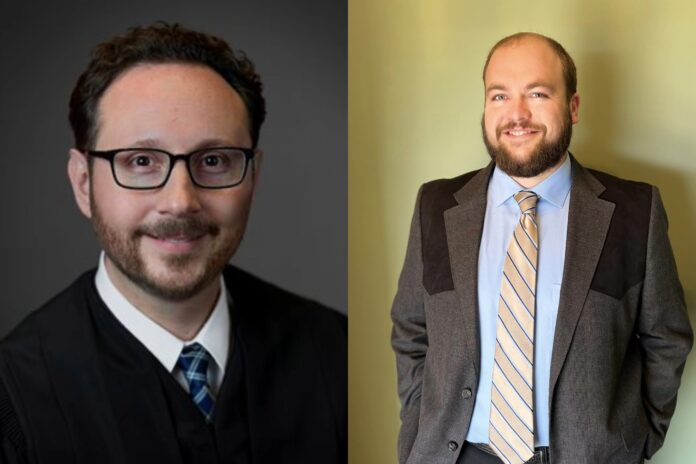
Despite the fact that Matthew Hanson didn’t raise any dollars to fund his campaign for the Minnesota Supreme Court, the 33-year old south metro attorney amassed more than 1 million votes in his losing bid against a former general counsel for Gov. Tim Walz.
Karl Procaccini, who Walz appointed to the state’s top bench in 2023, defeated Hanson, 33, of Credit River, by earning 56.6 percent of the vote.
But while Procaccini raised more than $111,000 in his successful bid to win a full six-year term on the bench, Hanson says he purposefully raised less than $750 in campaign funding and expenditures.
“I never accepted any money (despite multiple offers), and didn’t spend anything outside of the filing fee,” Hanson told Alpha News.
While Hanson never expected to win his contest against Procaccini, he said last May when he filed to challenge Procaccini that he was doing so to ensure Minnesotans had a choice when they “flipped their ballot over” to vote for the state’s top court.
“Although we came up short this election, it is inspiring to see that over a million Minnesotans want a choice in their judicial elections,” Hanson told his supporters in a social media post last week.
“I’d also like to thank the other non-incumbent challengers who threw their hat in the ring,” Hanson said. “Running for an election is certainly not an easy choice to make, but it is clear that Minnesotans are interested in judicial elections.”
Hanson’s challenge to Procaccini came as the DFL established a monopoly over all seven seats on the Minnesota Supreme Court. After the retirement of Justice G. Barry Anderson in May, all seven sitting justices have been appointed by either former Gov. Mark Dayton or Walz, both Democrats. Anderson and former Justice Lorie Gildea were both appointed by former Republican Gov. Tim Pawlenty.
Procaccini openly considers himself a political progressive, and has been an active member of the American Constitution Society, a left-leaning legal organization founded in 2001 by legal counsel for former Democratic presidential candidate Al Gore.
Following his victory last week, Procaccini thanked voters for “entrusting me with a full six-year term on the (Minnesota) Supreme Court.”
“Running for office gave me the opportunity to have many conversations across the state,” Procaccini said in a social media post. “I heard again and again just how important our state constitution and state courts are to Minnesotans.”
Just nine out of 103 judicial seats were contested
Just nine of 103 judicial elections across the state were contested. Although none of the challengers in those races defeated incumbent judges, a closely watched race in the state’s Tenth Judicial District between Republican-backed attorney Nathan Hansen and Walz appointee Helen Brosnahan mirrored the results of the Hanson v. Procaccini contest.
Hansen, a Mahtomedi lawyer well known in many Republican circles, lost by 11 points to Brosnahan, who was appointed by Walz to fill a vacancy in 2022. The Tenth Judicial District covers eight counties that wrap around the northern portion of the Twins Cities. Voters in the counties that comprise the district favored Trump in 2016, 2020 and 2024.
The closest judicial race was decided by a few thousand votes in the Seventh Judicial District, which spans 10 counties in western and central Minnesota. In that race, Judge Timothy Churchwell won reelection over challenger Joel Novak by just 3 percentage points. Novak, of Alexandria, ran as a Republican for the Seventh Congressional District in 2020. Churchwell was appointed to his seat in 2017 by Gov. Dayton.
Other results on contested judicial races:
- Chief Justice Natalie Hudson retained her Supreme Court seat by earning 63 percent of the vote against challenger Stephen Emery, who has run for multiple offices. Hudson has served on the Minnesota Supreme Court since 2015 (appointed by Gov. Mark Dayton), but last year was elevated to chief justice by Gov. Walz when Lorie Gildea retired.
- In the Fourth Judicial District, which covers Hennepin County, Judge Matthew Frank won election with 72 percent of the vote over challenger Christopher Leckrone. Frank was appointed to the seat by Walz last year.
- An open seat in the Sixth Judicial District came down to a single-digit margin of victory for Shawn Reed, who garnered 54 percent of the vote over Gunnar Johnson. That district covers much of northeastern Minnesota.
- In the Second Judicial District, two Ramsey County judges were reelected. Judges Tim Carey and Timothy Mulrooney, both appointed to the bench by DFL governors, won new terms, with 62 percent and 59 percent of the votes, respectively.
Hank Long
Hank Long is a journalism and communications professional whose writing career includes coverage of the Minnesota legislature, city and county governments and the commercial real estate industry. Hank received his undergraduate degree at the University of Minnesota, where he studied journalism, and his law degree at the University of St. Thomas. The Minnesota native lives in the Twin Cities with his wife and four children. His dream is to be around when the Vikings win the Super Bowl.
















